
African Foreign Policies
Routledge (Verlag)
978-0-367-34828-1 (ISBN)
In the past, African foreign policy has largely been considered within the context of reactions to the international or global “external factor”. This groundbreaking book, however, looks at how foreign policy has been crafted and used in response not just to external, but also, mainly, domestic imperatives or (theoretical) signifiers. As such, it narrates individual and changing foreign policy orientations over time—and as far back as independence—with mainly African-based scholars who present their own constructs of what is a useful theoretical narrative regarding foreign policy on the continent—how theory is adapted to local circumstance or substituted for continentally based ontologies. The book therefore contends that the African experience carries valuable import for expanding general understandings of foreign policy in general.
This book will be of key interest to scholars and students of Foreign Policy Analysis, Foreign Policy Studies, African International Relations/Politics/Studies, Diplomacy and more broadly to International Relations.
Paul-Henri Bischoff is Professor of International Relations and erstwhile longstanding Head of Department of Political and International Studies at Rhodes University, Grahamstown-Makhanda, South Africa.
1. Introduction 2. What Next? Past and present African foreign policy concepts and practices 3. The African Union as a Foreign Policy Player: African Agency in International Cooperation 4. Unprincipled Pragmatism and Anti-Imperialist Impulses in an Interconnected World: The Zuma Presidency, 2009-2017 5. Towards A Strategic Culture Approach to Understanding and Conceptualising Ethiopia’s Foreign Policy Towards Israel and the Middle Eastern Arab Countries 6. Nigeria’s Foreign Policy and Intervention Behaviour in Africa: What Role for Agency? 7. Zimbabwe and New Signifiers: Towards a cultural political economy of Foreign Policy Making 8. Realist Conceptions of Kenya’s Foreign Policy and Foreign Policy Behaviour: A Theoretical and Contextual Disposition 9. Addressing the Conceptual Void of African Small State Foreign Policy in Orthodox Theory: A Case Study of Botswana's Principled Pragmatism 10. Tunisia’s Foreign Policy Towards France Before and After an Undemanding ‘Revolution’: A Theoretical Explanation of the An-Nahdha-led Interim Governments’ Soft Policy 11. Straddling Between Convergence and Divergence: A Constructivist’s View of Malawi’s Foreign Policy in Post-independence Africa 12. Strategies of a Small State Between Realism and Liberalism: Sixty Years of Guinea’s Diplomacy and Foreign Policy (1958-2018) 13. Rethinking SADC’s Collective Policymaking Processes on External Relations and Non-state Participation for Region-building 14. Towards an Understanding of the Interplay Between Ghana’s Foreign and Defence Policies 15. Conclusion
| Erscheinungsdatum | 17.04.2020 |
|---|---|
| Reihe/Serie | Routledge Studies in African Politics and International Relations |
| Zusatzinfo | 1 Tables, black and white; 3 Line drawings, black and white; 3 Illustrations, black and white |
| Verlagsort | London |
| Sprache | englisch |
| Maße | 156 x 234 mm |
| Gewicht | 453 g |
| Themenwelt | Naturwissenschaften ► Geowissenschaften ► Geografie / Kartografie |
| Sozialwissenschaften ► Politik / Verwaltung ► Europäische / Internationale Politik | |
| ISBN-10 | 0-367-34828-4 / 0367348284 |
| ISBN-13 | 978-0-367-34828-1 / 9780367348281 |
| Zustand | Neuware |
| Haben Sie eine Frage zum Produkt? |
aus dem Bereich


